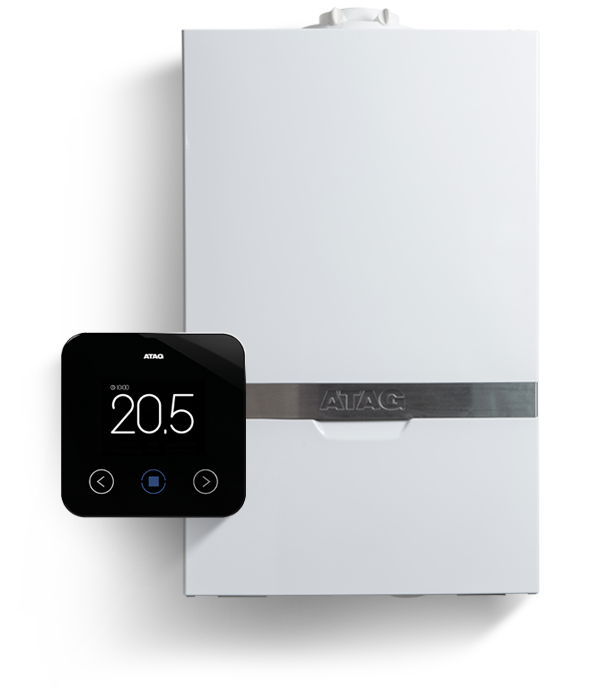Energy-Efficient Boilers
We rely on boilers all year round. Ensure you’re saving both money and energy by discovering everything you need to know about energy-efficient boilers.
Whether you’re a homeowner, business, or installer, boiler efficiency and cost-effectiveness are common concerns and, with the rising cost of energy, these topics are becoming increasingly significant.
We rely on boilers all year round for both hot water and general heating. Having a better understanding of your boiler – how it works, the different types of boilers available, which type is best for you and the efficiency of your current boiler – can help to ensure your appliance is operating at maximum efficiency, and that you’re consistently saving in terms of both energy and money.
Read on to discover everything you need to know about energy-efficient boilers.
Table of contents:
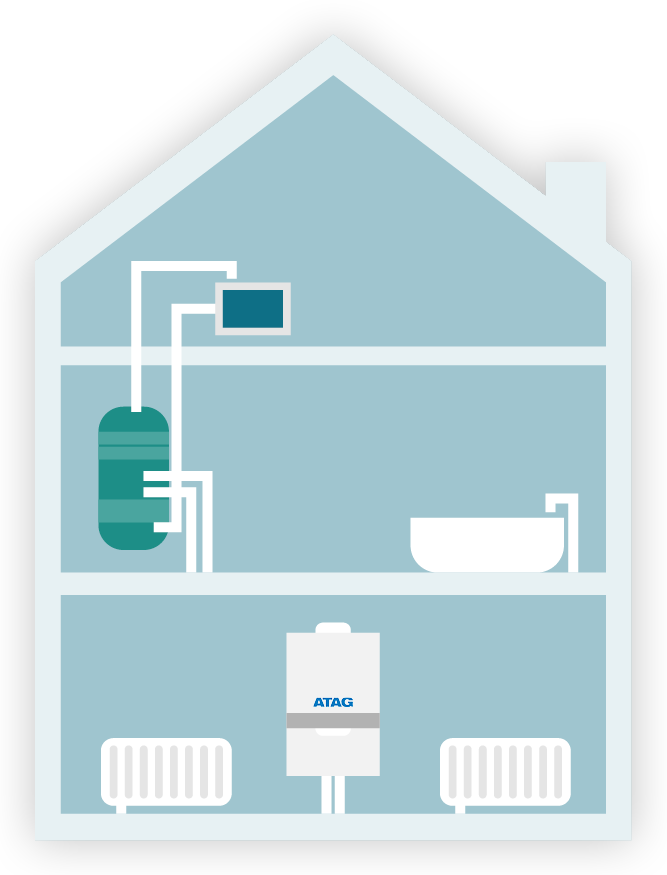
How does a boiler work?
As one of the most important ways for people and businesses to heat their homes or buildings, ‘how do boilers work’ is a common question. The simple answer is this: When you create a demand for heating or hot water, the boiler carries out internal pre-safety checks before igniting. Once the boiler has carried out its safety checks, the gas valve opens enabling gas to enter the burner which is ignited by the electronic ignition. The burnt gases then heat the heat exchanger, allowing heat transfer from the burnt gases (products of combustion) to the heat exchanger (a metallic component that is highly conductive and allows heat transfer from the burnt gases to the water inside the central heating system without the two having to meet).
As the water flows through your boiler, the boiler will increase the temperature in the heat exchange based on the controls of the system and boiler settings. This water is then transported via pipes to your radiators placed around the home or building, or the hot water cylinder if fitted, providing you with heat and hot water.
What are the different types of boilers?
When looking to purchase or install a boiler, it’s important to explore all the different types on the market to discover which boiler is best for you.
The different types of boilers we see today typically consist of combination (combi) boilers, system boilers, and regular boilers. At ATAG, we also provide an Economiser combination boiler.
If you’re not sure which type of boiler you need, simply take our boiler quiz. We’ll provide a recommendation and quote based on the specification of your home.
1. Economiser combination boiler
Specific to ATAG, the Economiser combination boiler was designed as our engineers developed a compact and highly efficient method to use the wasted flue gases when boilers were being used for hot water. As a result, they set upon harnessing the wasted energy and the ATAG iC Economiser Plus was born.
The Economiser Plus works by capturing waste energy from the flue gases and uses it to pre-heat the mains water to improve hot water production efficiency. With flow rates at an impressive 12.6 l/m - 17.0 l/m at 35°C temperature rise – even higher flow rates than a conventional combi – the Economiser works to provide you with improved hot water delivery and significant cost savings.
Read more about the Economiser combination boiler here.
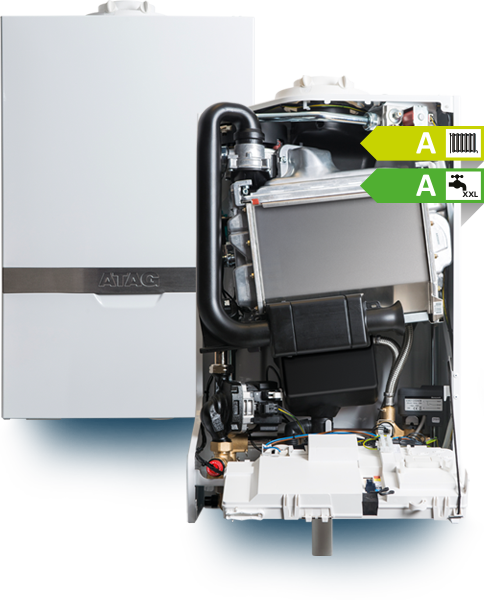
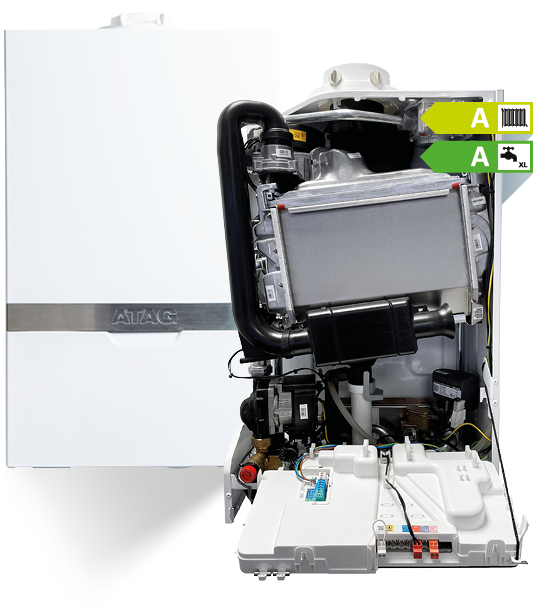
2. Combination boiler
Combination (combi) boilers are designed to combine all components for the boiler to deliver both heating and hot water directly from the boiler. A key benefit of the combi boiler is that they don’t require a separate water storage tank or cylinder; taking advantage of mains water, the combi boiler provides heat and hot water in a matter of seconds.
With simple-to-use controls, including a separate hot water thermostat for added safety, they are extremely user-friendly and energy-efficient. Also, with our flue solutions, you can fit combi boilers almost anywhere you like.
Read about our iC Combination boiler here.
3. System boiler
System boilers are traditionally fitted with an unvented hot water cylinder which facilitates an increased capacity of hot water and heats quickly.
Often referred to as closed vent or sealed system boilers, these models are highly suited to homes or buildings that are in high demand of hot water as they don’t require a cold-water cistern and are flexible in terms of where they can be installed. They don’t utilise as much space as their pumps are fitted internally to the boiler, giving more flexibility in terms of where they can be installed – fitted into the body of the system boiler itself
System boilers offer excellent efficiency and low-maintenance performance and are easy to install and operate.
Read about our system boiler here.
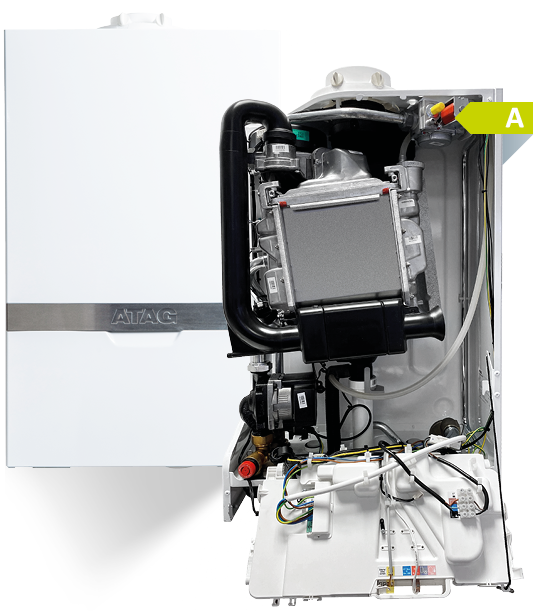
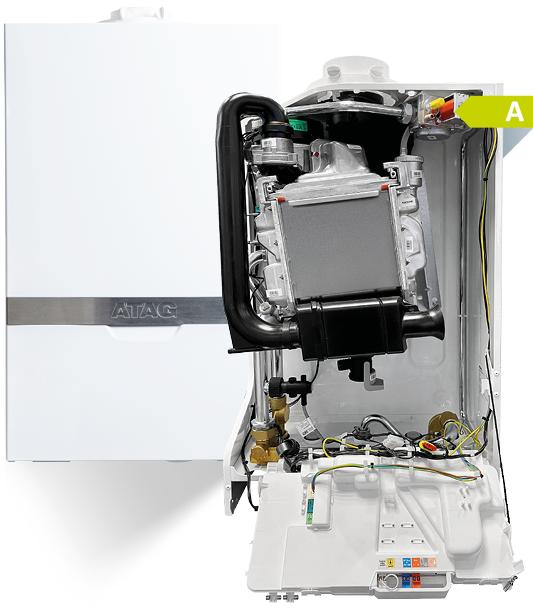
4. Regular boiler
With regular boilers, also known as conventional boilers or heat-only boilers, water is fed to the boiler and system via a feed and expansion. They can be converted to sealed systems if need be. Some of their components are housed externally, however, regular boilers can be fitted anywhere within the property,
Regular boilers deliver hot water via a hot water cylinder which is fed from its own feed and expansion tank. They are specifically designed for open-vented systems, or for spaces that have older heating systems that may not be able to tolerate the pressure of a closed system.
Whilst they’re the same size as ATAG’s other boilers and just as efficient, the system differs as the pump is not directly controlled by the boiler's PCB. Additionally, regular boilers are often the only option for houses with older radiators or low water pressure.
Read about our regular boilers here.
All ATAG boilers use high-quality stainless-steel heat exchangers for maximum efficiency and durability as standard and offer a lifetime guarantee on the heat exchanger.
Click here to get in touch with us.
Which is the best boiler for energy efficiency?
Finding an energy-saving, high-efficiency boiler is key to saving money on your fuel costs and ensuring you get the most out of your appliance.
So, which is the best boiler out there? More modern boilers are undoubtedly more efficient than their older counterparts due to their ‘condensing’ nature
Combi boilers
As a single unit, combi boilers are highly efficient as they directly provide hot water for your water supply and heating. Taking water from the mains and heating it on demand means there is no need for a storage tank. As water is drawn from the mains, combi boilers provide high-pressure hot water. This is, of course, only achievable if your water pressure is high enough, to begin with.
If there’s a high demand for hot water within your building or household, the combi boiler may not be able to cope. Additionally, whilst it's often only a matter of seconds, a combi boiler needs time to heat the water supply. Finally, a combi boiler may not be available to install if your home or building has older plumbing, as the combi requires high water pressure to function.
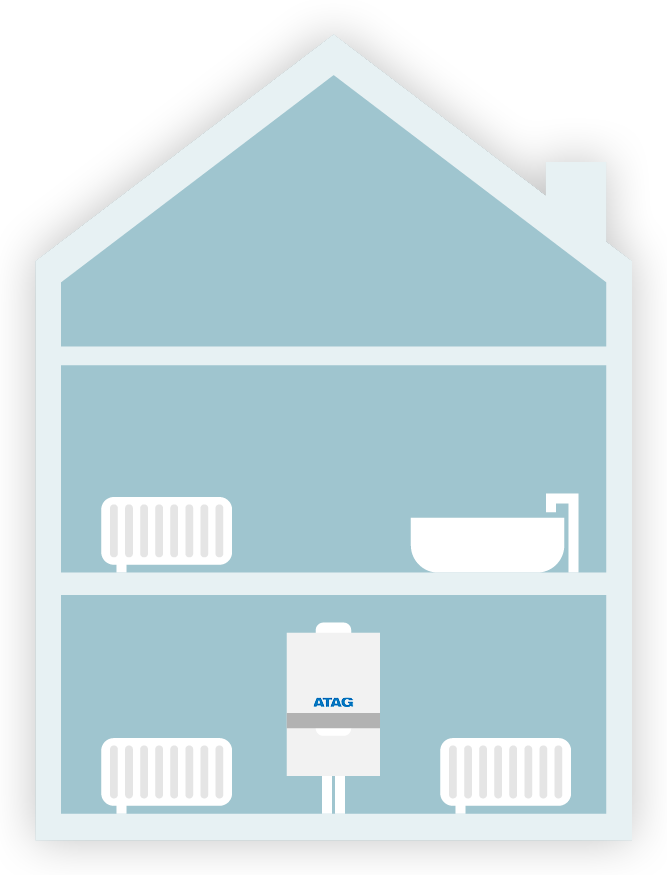
Homeowner
Find out moreProfessional
Find out more
System boilers
System boilers operate with a water cylinder, meaning they require space to house the tank. If you do have space available, a system boiler has the advantage of being able to cope with the high demands of hot water. They will typically take 30 minutes or more to heat a cylinder from 20 degrees to 60 degrees. Whilst this is a longer heating time than the likes of a combi boiler, system boilers offer the benefit of being compatible with solar panels, meaning you can generate power to heat the hot water cylinder, should you have solar panels installed.
Like the combi boiler, system boilers require high water pressure. As two separate units, they also come with the disadvantage of requiring more maintenance should something go wrong. Nevertheless, the cylinder of the system boiler has the advantage of a backup via an immersion heater. This is an additional benefit over the combi boiler as if the combi breaks down entirely, both heat and hot water can be lost, whereas, with the immersion, the homeowner is still able to access hot water. There’s also the question of heat loss; as system boilers hold water in a cylinder, once the water is heated, the temperature will slowly drop. To avoid heat loss, the system boiler’s cylinder requires sufficient insulation which, if not provided, will affect the boiler’s efficiency. However, all unvented cylinders are factory insulated.
Homeowner
Find out moreProfessional
Find out moreThe most efficient boiler for you
The most efficient gas boiler for you will depend on the type of home or building you reside in – in terms of size, the modernity of the building, and the strength of your water pressure. If you operate a smaller space that has high water pressure, a combi boiler might be the right choice for you. If your area is large and demands greater volumes of hot water – and you have the high water pressure to back this up – a system boiler will be your best option. And if you have an older space with low water pressure, a regular boiler will be the more applicable option. Nevertheless, system boilers will be slightly more efficient overall due to the components such as the pump being internal to the boiler.
How efficient is my boiler?
To keep your costs to a minimum, ensuring you have installed an energy-efficient boiler is essential. Older boilers will, over time, become less efficient and more costly. As a result, the industry recommendation is to change your boiler every 15 years, on average. If you’re looking to upgrade your boiler, find out the key things to consider here.
To check the efficiency of your boiler, you should look at its efficiency rating – which, by law, it is required to state. You should be able to check this via a small sticker on the boiler or by looking at your boiler’s information pack if you have it. The efficiency rating ranges from A to G, with A being the most efficient and G being the least. The efficiency rating is based on the boiler’s performance and the energy consumption needed for your heating and hot water.
Boiler efficiency will come down to a number of key factors such as:

Access to mains gas: boilers that are powered by mains gas will be less costly than the likes of oil, LPG (liquid petroleum gas), and coal.
Flow temperatures: you can maximise the efficiency of your boiler by lowering the flow temperature.
The model you choose: after learning which type of boiler is best for you, you then need to choose the right model. Selecting a model that is sustainable – in terms of carbon emissions and longevity – will increase your chances of running an efficient boiler.
The type you install: the type of boiler that’s most applicable to your building or home in terms of size, demand for heat and water, and the water pressure available to you will impact its efficiency.
The more efficient your boiler, the cheaper your gas bills will be this winter which is more important than ever as household energy costs soar. For our top tips on how you can prepare for the increase in bills, read our article here.
Learn more about our 14-year warranty program
For a limited period, we are offering 10-14 year warranty on a selection of our products
Ensure your boiler is serviced regularly
Booking an annual service check for your boiler, as you would with a car, for example, will help you to gauge whether or not it’s running safely and smoothly. The engineer carrying out the check will ensure your boiler is set up efficiently.
From design through to installation and after-care service, our ATAG Selected Partners are trained in our entire product range. They are on hand to offer you excellent advice and the best solution that suits your needs. Find an ATAG-approved installer here.
Check for deposits in your pipes and radiators
Flushing out your pipes before fitting the boiler will ensure consistent operational efficiency. Additionally, you can fit a filter to protect the boiler, and carry out annual water checks. These tasks should be executed by a service engineer who can take action if need be. We have a whole directory of approved installers who can help you with tasks such as these, find one local to you here.
Insulate your pipes
Applicable to all boilers – you can insulate your pipes by covering them with foam pipe lagging. This will provide protection so that as little heat as possible can escape, keeping more heat in your central heating or water pipes.
Thaw condensate pipe
During the winter, many areas of the UK will experience prolonged spells of extremely cold weather – down to minus 15oC in some areas. This can cause drainage and condensate pipes to freeze. Frozen condensate pipes can result in your boiler shutting down. You can prevent frozen condensate pipes by fitting them internally. Where this is not possible, you can use products such as Condensate Pro.
Find out how to combat this here.
Occasionally turn on the heating
If boilers are left unused for prolonged periods of time, they can seize up which can lead to breakdowns. This can incur maintenance costs or even a replacement if you do not have a warranty in place. While it might not seem right to turn the heating on during the warmer months, doing so occasionally and for short periods of time could save you money by preventing damage or breakdown.
Top up the pressure
You can check your boiler pressure with a gauge on the front of the boiler. Check the pressure valves to ensure that they haven’t become loose as doing so can cause your pressure to be too high. As it’s easy to over-pressurise your boiler, which can cause more issues, we advise you to call in a professional to guarantee the tasks are carried out correctly.
Bleed your radiators
Bleeding your radiators will allow you to remove any air that’s trapped inside which can affect the efficiency of your heating system. This can help to ensure your rooms are heated up quicker and will avoid an increase in heating costs. To bleed a radiator you will need a radiator key, a receptacle to catch water coming from the radiator, a towel in case of spillage, and some rubber gloves (as fabric gloves will absorb hot water and not protect your hands).
Simple steps to bleed a radiator:
- Turn on your heating
- Pinpoint the radiator (or radiators) that need bleeding
- Turn the heating off and allow the water inside to cool
- Position your towel underneath the bleed valve
- Open the valve to release any air that may be trapped inside
- Close the valve when water starts to come out
- Examine your boiler pressure to ensure the job has been successful and re-pressurise it if need be. If you find yourself needing to do this regularly, seek the advice of a gas-safe engineer.
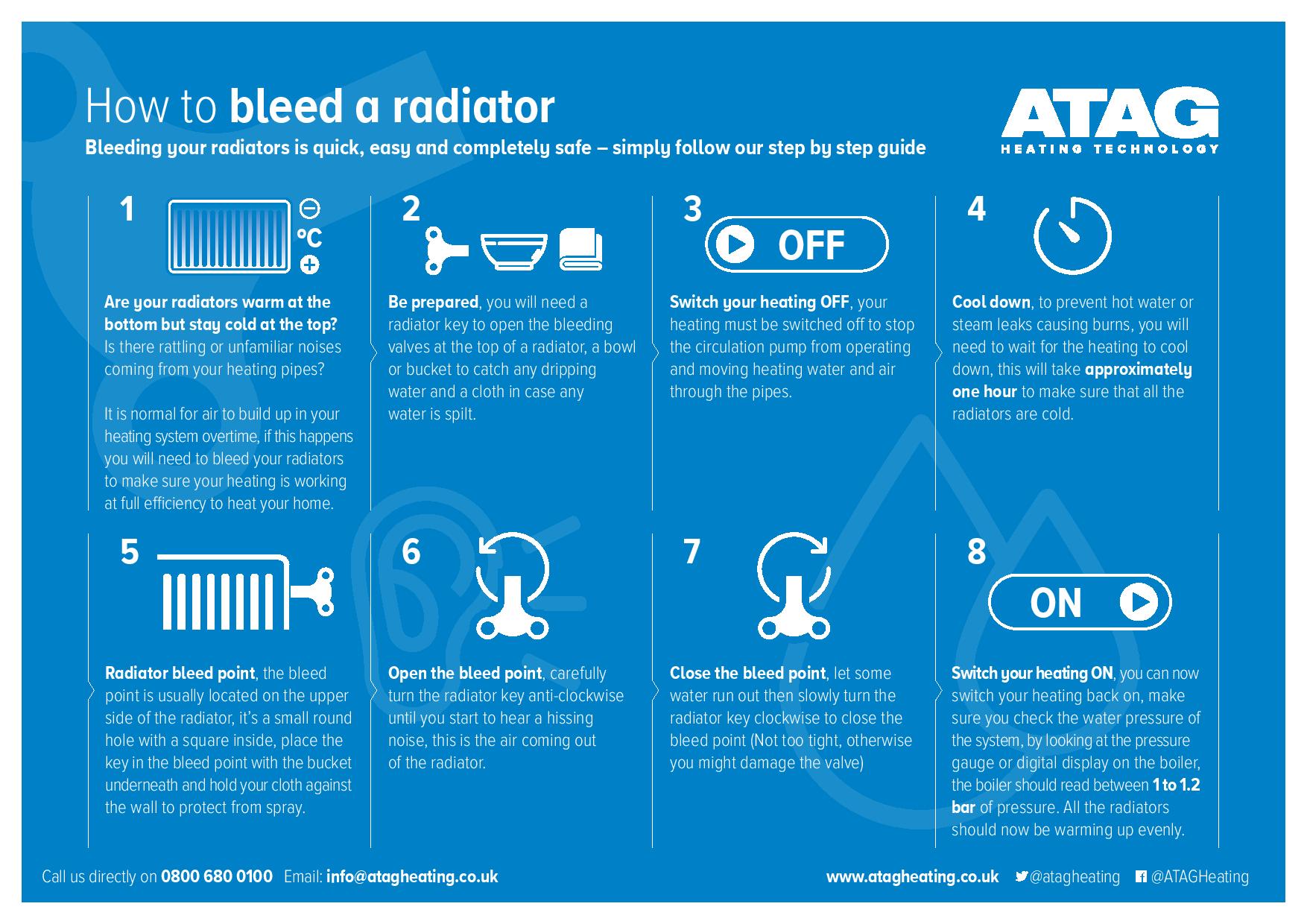
Or, similar to topping up your pressure, you might find that a more effective solution is to contact a professional.
The best way to increase efficiency apart from fitting an energy-efficient boiler is to increase the insulation of your property and lower the flow temperature as this maximises the potential of your boiler. If these tips provided above fail to keep your boilers running efficiently, it may be time to install a new boiler.
How ATAG can help
Every ATAG boiler carries a 10 years warranty as standard with options of up to 14 years on our complete boiler range. At ATAG, we provide homeowners with exceptional heating equipment that can truly be relied upon. Selling only through selected gas-safe registered installers, you can be safe in the knowledge that the product you invest in is safe, energy-efficient and has one of the lowest carbon emissions on the market.
For installers, our direct-sales model and outstanding customer service – including next-day delivery and a dedicated 24/7 support line – will help to protect and grow your business, enabling you to deliver and install boilers with confidence.
We’re committed to providing our customers with professional products and services. Get in touch with us here for general enquiries, more information, or to access our products and services.
Interested in becoming a ATAG Selected Partner?
If you're interested in becoming a ATAG Selected Partner, simply click on the button below to submit your form. If you'd like more information about our boilers, why not book a demo below?
Become a registered installer Book a product demo.png?width=250&height=76&name=ATAG%20Logo%20(72dpi%20RGB).png)
